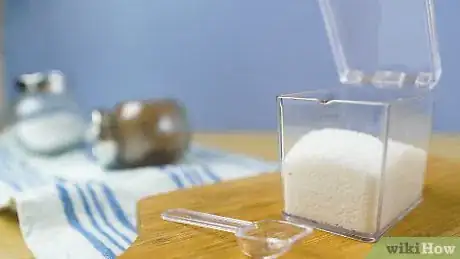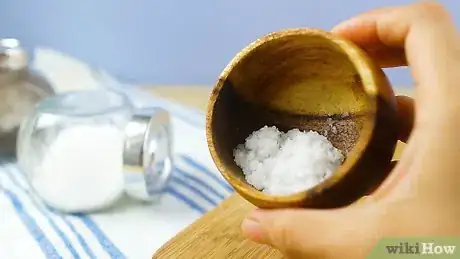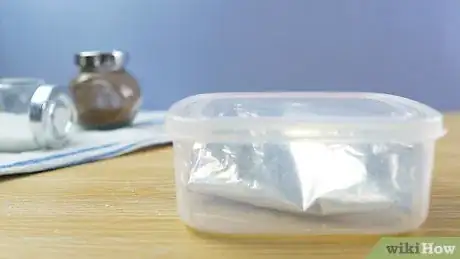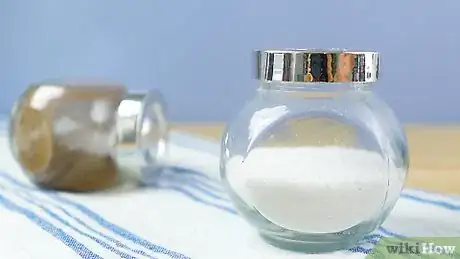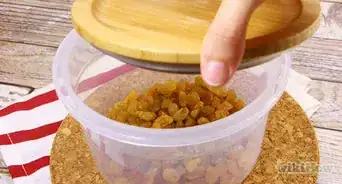This article was co-authored by wikiHow staff writer, Amy Bobinger. Amy Bobinger has been a writer and editor at wikiHow since 2017. She especially enjoys writing articles that help people overcome interpersonal hurdles but frequently covers a variety of subjects, including health and wellness, spirituality, gardening, and more. Amy graduated with a B.A. in English Lit from Mississippi College in 2011 and now lives in her hometown with her husband and two young sons.
There are 8 references cited in this article, which can be found at the bottom of the page.
The wikiHow Culinary Team also followed the article's instructions and verified that they work.
This article has been viewed 13,272 times.
Learn more...
Kosher salt is a type of salt that's light and flaky. The larger flakes make it great for cooking, including seasoning foods and sauces or even for salting water. It's also ideal for koshering foods, which is where this type of salt gets its name. You can store kosher salt the same way you would any other type of salt—keep some on hand for when you're cooking, or store larger amounts of kosher salt in your pantry to ensure you have plenty of this essential spice in your long-term food storage.
Steps
Short-Term Storage
-
1Transfer your kosher salt into a small container with a tightly-fitted lid. A salt box, also called a salt cellar, is a small bowl or container with a tight-fitting lid that's made for storing salt. When you store your salt in one of these containers, it seals out moisture, food splatter, and odors that could otherwise end up your salt.[1]
- When you need to salt your food, simply lift the lid and grab a pinch with your fingers, or use a measuring spoon to scoop out the salt if you need a more precise amount.
Did You Know? Since kosher salt has larger flakes than table salt, it won't flow easily from a traditional salt shaker.
-
2Try an open-sided vessel called a salt pig for a convenient alternative. A salt pig is an open-mouthed container, usually made of ceramic, with a hooded top. Fill the bowl of the container with your salt, then place it next to your stovetop, where you can easily pinch or scoop out the salt you need for your recipe.[2]
- The hooded top on a salt pig keeps out food, dust, and other contaminants in the environment, along with much of the moisture that would normally cause your salt to clump up. However, if you live in a very humid environment, you may have better results from a salt box with a fitted lid instead of an open salt pig.
- When you're shopping, look for a salt pig with a wider mouth for easier measuring.
Advertisement -
3Use a salt mill or grinder at the table for finishing food. The coarser grains of kosher salt are perfect for cooking, but they can be a little large for adding a sprinkle of salt to a finished dish. However, you can create a finer-grained product by pouring your kosher salt into a salt mill. Just crank or twist the grinder over your plate to break up the salt grains and season your food.[3]
- Since small-grained table salt is preferred for baking, you could also use your salt grinder if you want to include kosher salt in your baked goods.
- Be sure to use a salt grinder, rather than a pepper grinder. Many pepper grinders have steel parts, which will corrode in salt.[4]
-
4Toss out the salt if it clumps badly or develops odors. Kosher salt doesn't have a shelf life—it will stay good indefinitely, as long as it's pure salt and it doesn't become contaminated. If moisture gets into the salt and it clumps, try breaking it up with the back of a spoon. However, if the clumps have hardened, or if the salt starts to absorb food odors from the kitchen, replace it with fresh salt.[5]
- If your kosher salt is iodized, it won't last indefinitely, but the shelf life is still around 5 years.[6]
Long-Term Storage
-
1Place the salt in an airtight plastic or glass container. If you're storing a large amount of kosher salt, don't just keep it in its original packaging—it may not seal out moisture effectively, and if you store the salt in large batches, you'll have to throw it all out if it gets contaminated. Instead, break it into smaller batches by pouring the salt into containers with tight-fitting lids, like canning jars with plastic lids.[7]
- Don't use metal containers or lids, as the metal could corrode and leach into the salt.
- Wooden containers may not seal out moisture as well as glass or plastic containers.
-
2Vacuum seal the salt in bags for a space-saving option. Hard-sided containers will keep your salt perfectly well, but they can take up a lot of space. If you'd prefer, pour your salt into mylar bags, then squeeze out all of the air and seal the bag by running a clothes iron or hair straightener across the opening.
- When you're finished, put all of the mylar bags into a larger container, like a bucket with a lid.
-
3Store your kosher salt in a cool, dry location. Salt will absorb moisture that's in the environment, even if it's well-sealed. To help prevent that, place your containers of salt in a spot that isn't subjected to temperature and humidity fluctuations.[8]
- For instance, you might keep your salt in a pantry or cellar, but it's better to avoid keeping it near your stove or in a spot near a heating or air conditioning vent.
- If you can, try to avoid storing the salt in the kitchen at all, as it could absorb food odors over time.
-
4Keep the salt indefinitely if it doesn't have any additives. Most kosher salt is free of any preservatives or other additives that could shorten its shelf life. In fact, pure salt doesn't have a shelf life, so as long as it doesn't absorb moisture or odors, it will be good forever.[9]
- If your kosher salt is iodized, it has a shelf life of about 5 years.[10]
- If the salt has any added herbs or seasonings, the shelf life of the salt is whatever those herbs or seasonings would be.
References
- ↑ https://www.cooksillustrated.com/equipment_reviews/1675-salt-storage-containers
- ↑ https://www.thekitchn.com/good-product-salt-pig-106794
- ↑ https://cooking.stackexchange.com/questions/3720/what-is-the-point-of-a-salt-mill
- ↑ https://www.chowhound.com/post/pepper-mill-salt-mill-difference-902477
- ↑ https://www.stilltasty.com/fooditems/index/18262
- ↑ https://stressbaking.com/storing-baking-ingredients/
- ↑ https://stressbaking.com/storing-baking-ingredients/
- ↑ https://stressbaking.com/storing-baking-ingredients/
- ↑ https://www.stilltasty.com/fooditems/index/18262
